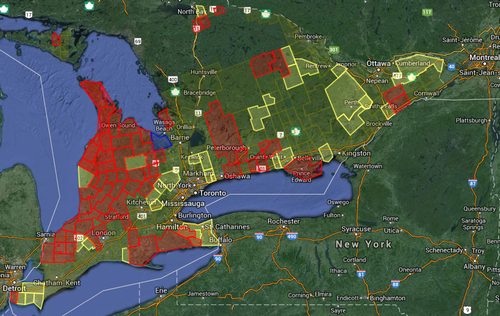Ontario towns flock to declare themselves “unwilling hosts” for wind farms
News, Wind turbines Add commentsIn the wake of several years of heated wind farm resistance in Ontario, premier Kathleen Wynne said several months ago that the province would aim to site new projects in “willing communities.” In response, 71 southern Ontario communities have formally passed resolutions declaring their towns “unwilling” (red on map; interactive version here) and another 33 have expressed some measure of concern about local siting (yellow); together, this represents a bit over half of the 197 municipalities in the southern part of Ontario where wind development has been concentrated. A coalition of these towns formed at an August meeting of the Association of Municipalities Ontario. It remains to be seen whether provincial officials will alter siting decision based on these declarations; provisions of an altered wind strategy appear to focus on “consultations” with localities (rather than requiring local approval of projects) and incentives to encourage local support for wind development.
UPDATE, 12/2/13: The Dufferin County Council has voted to declare the county an unwilling host, become the first county to do so; several town within the county are among the over 90 Ontario towns that have made similar declarations.

In a statement issued this week, the coalition of “unwilling” towns said: “Municipalities are seeing the impact of existing turbines on their communities or their neighbours and do not want the same things to happen in their municipality. The government’s proposals for community benefit programs and community sponsorship do not address the core problems being created when wind turbines are located too close to people.” Added Wainfleet mayor April Jeffs, “Municipalities are looking for solutions to the real problems, not public relations gimmicks.”
“The government has indicated that an announcement regarding the guidelines for new large-scale FIT projects is planned for the end of October or in early November,” said Kevin Marriott, mayor of Enniskillen. “Municipalities are looking for real planning authority for wind turbines to be returned to local governments. Municipalities are better placed than Queen’s Park civil servants to identify local issues that need to be addressed in reviewing wind turbine projects. They also have processes in place to review and approve other complex or controversial building projects within their jurisdiction.”
Earlier, Marriott had noted that while the Premier has spoken about wanting to locate projects in willing host communities, no concrete plans have been proposed to give municipalities substantial input in the siting process, and wind turbine projects have continued to get provincial approval without consideration of municipal concerns.
UPDATE, 10/10/13: This week, a wind project received provincial approval in Kincardine, one of the towns that has declared itself an unwilling host. One local council member noted with dismay that the province had embarked on an expensive change of siting for two gas-fired electric plants because the initial communities had not welcomed them, while similar concerns about wind farms are ignored.
Indeed, Wynne made her commitment to continued wind development clear even as she attempted to outline a more responsive relationship with communities, stressing that the province needs to find a way to ensure green energy projects are “going to willing communities.” In a draft of the new FIT structure released in September, there was no mention of communities being able to opt-out, though there are provisions for “local consultations.”
Her Energy Minister, Bob Chiarelli, has been overseeing the revamping of the FIT, including a new requirement that companies consult with local authorities before going to the province for approval. “They will have a much stronger voice in all of the significant energy projects,” said Chiarelli “Communities spoke, mayors spoke, and we listened.” Since localities do not seem likely to get veto power, the formal “unwilling hosts” designations appear to be more of a public statement than marking the establishment of wind-free zones. The revamped FIT program will include incentives including new funding for municipalities who want to do energy planning; Chiarelli said, “We believe that process will result in a much higher level of buy-in and participation by municipalities.”
Well, maybe not, if the summer and fall rush to declare themselves “unwilling hosts” is any indication; it appears that the Ontario wind wars will be continuing.
